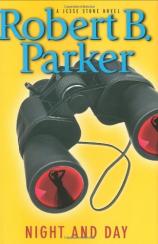Night and Day: A Jesse Stone Novel
Review
Night and Day: A Jesse Stone Novel
Robert B. Parker is the acknowledged dean of American crime
fiction. His creation of the private eye with no first name,
Spenser, revitalized the genre almost four decades ago, and the
series has since become a classic of American literature. But
Parker took a risk in 1997 when he branched out and introduced a
new series starring small town Massachusetts police chief Jesse
Stone. The comparisons to Spenser were inevitable.
NIGHT AND DAY is the eighth novel featuring Stone. And the
writing is so good that the arrival of a new Stone story is as much
a cause for rejoicing as the arrival of a Spenser novel. Just as
with Spenser, the Stone books are getting stronger with each
outing. In Stone, Parker has created a more complex, troubled hero
than his wisecracking Boston detective, Spenser.
Paradise is a small town on the Massachusetts coast with a
police force of only 12 members. Jesse’s chief assistant and
partner in playful banter is Molly, the only woman on the force. At
one point in NIGHT AND DAY, she says, “I feel like I am
serving and protecting Sodom and Gomorrah.”
Well, maybe.
The perversity starts when Betsy Ingersoll, the female principal
of the junior high, marches all the young girls into a locker room
before a dance and orders them to lift their skirts. She needs to
inspect their underwear to prevent them from becoming
“sluts.” Complicating matters is the fact that
Ingersoll’s husband is the managing partner of the biggest
law firm in the state.
Jesse is not sure what the principal can be charged with, but he
wants to do something to stand up for the violated privacy rights
of the kids. His interest deepens when one of the girls tells him
of the existence of a “swingers club” in the town, with
swinging parties going on in her house while she and her younger
brother are present. She can come to Jesse for help. “Most
adults aren’t like you,” she tells him.
Then there’s the weekly Wednesday night appearance of a
“peeping tom” who not so gradually turns into a home
invader. Calling himself “The Night Hawk” in creepy
letters to Jesse, the man breaks into houses, orders the sole
female occupants to strip at gunpoint and then takes pictures of
them. Soon the Night Hawk is taunting and almost begging Jesse to
stop him before he does something violent.
And finally there’s the problem of Jesse’s
alcoholism. His drinking is directly related to his relationship
with the love of his life, his ex-wife Jenn. Jesse divorced Jenn
back when he was an LA police detective. Having drunk his way off
that force, Jesse came east to take the chief’s job in the
excellent NIGHT PASSAGE, which kicked off the series 12 years ago.
But Jenn followed him, and in the years since they have had an
on/off relationship. What is clear is that Jesse has never stopped
loving her.
Now Jenn is gone again and Jesse is hitting the bottle hard at
night alone in his apartment, talking to his picture of Ozzie Smith
on the wall and mourning both the loss of his woman and his once
promising professional baseball career cut short by injury.
But he is a functioning alcoholic, reserving his 16-ounce
glasses of scotch for his off-duty hours. Jesse goes to therapy,
but typically spends most of his time there trying to understand
the motivations of the actors in his cases. He is especially
worried about the Night Hawk and hopes that by understanding him
better, he will be able to stop him.
Personal demons aside, Jesse Stone is a great cop; he’s
compassionate and unable to let go of a case, traits he shares with
Parker’s greatest creation, Spenser. Jesse says at one point,
“I know better, but I still have to believe that if I keep
looking at it and turning it around and rolling around on it,
eventually I’ll come up with something.”
However, the power of NIGHT AND DAY is not just in the
fast-moving plot and watching Stone tie all the disparate elements
together. This is what good mystery writers do all the time. But
Parker is not just good, he’s great --- one of the greatest
writers to ever work the genre. The greatness in this book is
watching Stone struggle to come to grips not just with the
obsession that drives the Night Hawk, but with the obsession that
is driving and slowly destroying his own life: his obsessive love
for Jenn.
The true mystery is internal: the psychological struggle that is
driving a good man into the darkness. And this is where Parker does
some of the greatest writing of his career. Consider the following
passage:
“Jesse took in some more scotch. That was then. This was
now. It all seemed a downward spiral. He was going to be a big time
shortstop, and then he wasn’t. He was a detective in Robbery
Homicide in Los Angeles. Then he wasn’t. He was married to
Jenn. Then he wasn’t. He finished his drink and went back to
the bar to make another. He gestured with the full glass toward the
picture.
“‘You and me, Wizard,’ he said.
“Now he was a small-town cop in the far corner of the
country, drinking alone at night and talking to a f****** baseball
poster. He took his glass to the chair and sat and looked at the
phone. No need to turn the answering machine off, she wasn’t
calling back. He reached over and turned it on. He looked around
the empty room and took a drink.
“‘After this, what? he said aloud in the empty
room.
“He sat and thought about what he’d said, and nodded
his head slowly, and smiled faintly to himself.
“‘Nothing,’ he said. ‘Nothing at
all.’”
Writing does not get any darker or any better than that in the
mystery genre, or any other genre for that matter. Reading NIGHT
AND DAY is like being in the room when Sinatra belted o ut the
famous Cole Porter song of the same title for the first time. You
know you are witnessing a master at work at the top of his
game.
Reviewed by Tom Callahan on January 13, 2011





